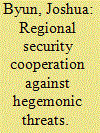| Srl | Item |
| 1 |
ID:
190285


|
|
|
|
|
| Summary/Abstract |
As the rise of Chinese power and North Korea’s nuclear development alter East Asia’s strategic landscape, American foreign policy analysts continue to look for innovative ways to bolster the security position of US allies in the region. MIT political scientists Eric Heginbotham and Richard Samuels highlight one potential option in a recent article in The Washington Quarterly, arguing that the United States should revitalize its alliances with Japan and South Korea by exploring “the wartime sharing of nuclear weapons,” which might involve “modifying hardware (e.g., certifying allied F-35s for nuclear delivery), acquiring new systems, and training air or naval crews in tactical nuclear strikes and command and control.”Footnote1 Similar proposals are not difficult to encounter in Washington’s policy community. One analysis calls for the “custodial sharing of nonstrategic nuclear capabilities during times of crisis with select Asia-Pacific partners, specifically Japan and the Republic of Korea [ROK].”Footnote2 Likewise, former Deputy Assistant Secretary of Defense Brad Roberts writes that “[a] more NATO-like nuclear umbrella makes good sense in Northeast Asia today.” Such arrangements “could be replicated in South Korea,” for example, “with US nuclear weapons permanently deployed there along with dual-capable fighter-bombers that would be flown by pilots from both countries.”
|
|
|
|
|
|
|
|
|
|
|
|
|
|
|
|
| 2 |
ID:
182870


|
|
|
|
|
| Summary/Abstract |
JOSHUA BYUN, D.G. KIM, and SICHEN LI examine the impact of the COVID-19 pandemic on the Chinese public’s foreign policy attitudes. Drawing on original surveys fielded in China during the first six months of the global pandemic, they find that ordinary Chinese citizens are optimistic about China’s future global position, and that this optimism corresponds with the widespread perception that the COVID-19 pandemic is accelerating China’s rise relative to the United States.
|
|
|
|
|
|
|
|
|
|
|
|
|
|
|
|
| 3 |
ID:
185009


|
|
|
|
|
| Summary/Abstract |
Conventional wisdom treats politicization in the international human rights regime as invariant: for any given violation, states condemn adversaries while coddling friends. However, we find that politicization patterns vary markedly across human rights issues. Some norms are more politicized than others, and states are more likely to punish geopolitical partners on certain violations. We offer a novel theory of politicized enforcement wherein states punish human rights violations discriminatively based on their perceived “sensitivity” for the target state. Using data from the UN Universal Periodic Review, an elaborate human rights mechanism, we show that states tend to criticize their adversaries on sensitive issues that undermine the target regime’s power and legitimacy while addressing safer topics with friends. By uncovering a strategic logic of human rights enforcement, this research contributes new theoretical insights on the relationship between norms and power politics in global governance.
|
|
|
|
|
|
|
|
|
|
|
|
|
|
|
|
| 4 |
ID:
183897


|
|
|
|
|
| Summary/Abstract |
Why do some regional powers collectively threatened by a potential hegemon eagerly cooperate to ensure their security, while others appear reluctant to do so? I argue that robust security cooperation at the regional level is less likely when an unbalanced distribution of power exists between the prospective security partners. In such situations, regional security cooperation tends to be stunted by foot-dragging and obstructionism on the part of materially inferior states wary of facilitating the strategic expansion of neighbours with larger endowments of power resources, anticipating that much of the coalition's gains in military capabilities are likely to be achieved through an expansion of the materially superior neighbour's force levels and strategic flexibility. Evidence drawn from primary material and the latest historiography of France's postwar foreign policy towards West Germany provides considerable support for this argument. My findings offer important correctives to standard accounts of the origins of Western European security cooperation and suggest the need to rethink the difficulties the United States has encountered in promoting cooperation among local allies in key global regions.
|
|
|
|
|
|
|
|
|
|
|
|
|
|
|
|